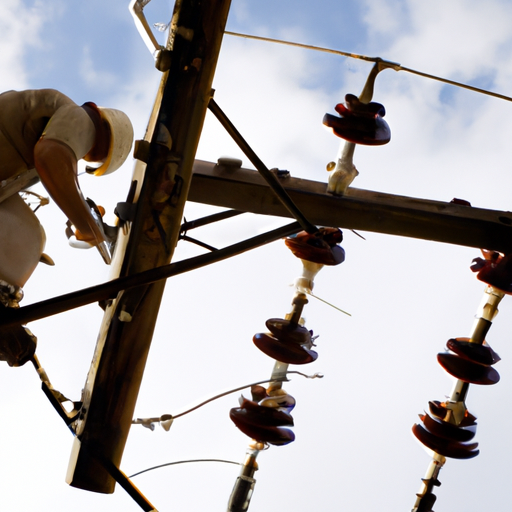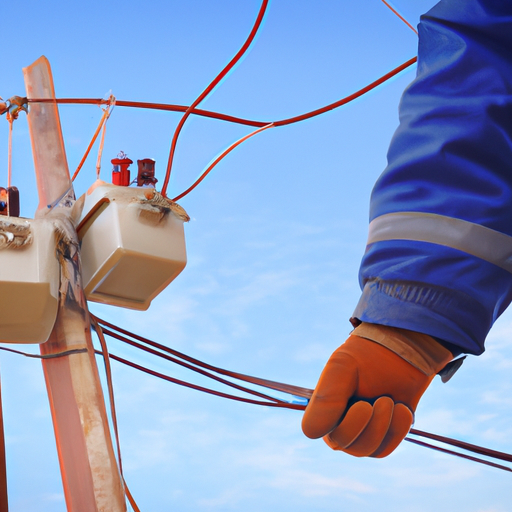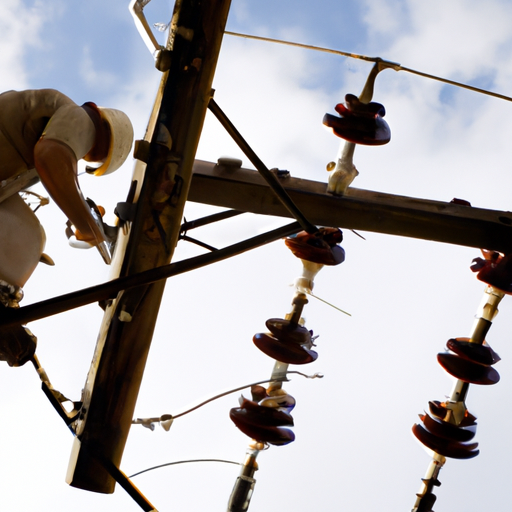Are you preparing for a lineman job interview and wondering what questions might come your way? Look no further! “Common Lineman Job Interview Questions” is here to help you ace your interview and land that dream lineman job. This comprehensive guide is packed with a variety of interview questions specifically tailored to the lineman industry. Whether you are a seasoned lineman looking for a new opportunity or a fresh graduate eager to break into the field, this product has got you covered. From technical questions to situational scenarios, it provides you with the essential tools to confidently navigate your upcoming interview.
General Questions
Why did you choose a career as a lineman?
Choosing a career as a lineman can be a rewarding decision for various reasons. One of the main factors that often motivates individuals to pursue this profession is the opportunity to work in a hands-on, technical field that directly impacts people’s lives. As a lineman, you have the chance to contribute to society by ensuring the reliable supply of electricity to homes, businesses, and other essential facilities. Additionally, the job offers stability, as the demand for skilled linemen remains high. The sense of accomplishment and job satisfaction that comes from maintaining and repairing electrical systems is another compelling reason why many people choose to become linemen.
What do you enjoy most about being a lineman?
One of the greatest things about being a lineman is the opportunity to work outdoors. If you appreciate fresh air and the ever-changing beauty of nature, this profession can provide a fulfilling work environment. As a lineman, you get to enjoy different seasons and experience the diversity of weather conditions. There is a sense of freedom that comes from working in the field, climbing poles, and traversing power lines. Moreover, the chance to solve complex technical issues and provide critical services to the community brings a great deal of job satisfaction.
What motivated you to apply for this position?
The motivation to apply for a lineman position can stem from various reasons. One common motivation is a passion for working with electrical systems and equipment. If you have always been drawn to the intricacies of electricity and have a desire to understand how power is generated, transmitted, and distributed, becoming a lineman can be an excellent career choice. The opportunity to make a positive impact on people’s lives and ensure that they have access to electricity also serves as a strong motivation. Finally, the sense of camaraderie and teamwork often associated with the profession can be a motivating factor for those who enjoy working collaboratively in a supportive environment.
Technical Knowledge and Skills
What experience do you have in electrical systems and equipment?
As a lineman, having experience in electrical systems and equipment is crucial. The ability to understand and work with various components of electrical systems is a fundamental requirement for this profession. Your experience may range from basic electrical knowledge to more advanced skills in handling transformers, switchgear, fuses, conductors, insulators, and other components. Proficiency in identifying electrical hazards and troubleshooting problems within the systems is essential. Additionally, knowledge of electrical symbols, diagrams, and schematics can greatly aid in working efficiently and effectively.
How proficient are you in using industry-specific tools and equipment?
Proficiency in using industry-specific tools and equipment is a key aspect of being a lineman. These tools may include lineman’s pliers, cable cutters, wrenches, crimpers, voltage testers, insulated gloves, and various climbing and safety equipment. Being familiar with these tools and their purposes is crucial for efficiently performing the tasks required in the field. Knowledge of how to properly maintain, clean, and store these tools is important to ensure their longevity and effectiveness.
Describe your knowledge of electrical safety codes and regulations.
Having a thorough understanding of electrical safety codes and regulations is essential to work safely as a lineman. Being aware of standards and guidelines set forth by organizations such as the Occupational Safety and Health Administration (OSHA) ensures that you prioritize safety and minimize risks. This knowledge includes understanding the requirements for grounding, the proper use of personal protective equipment (PPE), safety procedures for working at heights, and precautions when dealing with live electricity. Staying up to date with the latest safety codes and regulations is crucial to maintaining a safe work environment and protecting yourself and those around you.
Problem-Solving Skills
Can you provide an example of a challenging situation you encountered while working as a lineman and how you resolved it?
As a lineman, you will inevitably face challenging situations that require problem-solving skills. One example of such a situation could be encountering a fault in an underground cable that is disrupting the power supply to a neighborhood. In this scenario, you would need to use your knowledge and expertise to identify the exact location of the fault and repair or replace the faulty cable. This may involve using specialized equipment, such as fault locators, to pinpoint the issue underground. Following that, you would need to excavate the area, fix the fault, and restore the power supply to the affected area.
How do you approach troubleshooting electrical issues?
When troubleshooting electrical issues, it is important to approach the problem methodically and systematically. Start by gathering as much information as possible, such as the symptoms of the issue and any recent changes or events that may have triggered it. Next, use your knowledge of electrical systems to identify possible causes for the problem. This may involve checking connections, testing components, or using diagnostic tools. Once you have narrowed down the potential causes, follow a step-by-step process to eliminate each possibility until you find the root cause of the issue. Once the problem is identified, devise a plan to resolve it and implement the necessary repairs or adjustments.
How have you overcome obstacles in the past?
Overcoming obstacles is an inherent part of being a lineman. Whether dealing with challenging weather conditions, complex technical issues, or time constraints, linemen must find ways to overcome obstacles efficiently and effectively. One approach to overcoming obstacles is to break down the problem into smaller, more manageable tasks. By focusing on one step at a time, you can make progress and gradually overcome the obstacle. Seeking assistance from colleagues or supervisors can also be beneficial, as collaborative problem-solving often leads to innovative solutions. Additionally, demonstrating adaptability and flexibility, as well as having a positive mindset, can go a long way in overcoming obstacles and achieving success in your work as a lineman.
Teamwork and Communication
Describe a time when you had to work collaboratively with others to complete a project.
Linemen often work as part of a team to complete projects efficiently and safely. One example of working collaboratively could be the installation of a new transformer in a residential area. This project would involve multiple linemen working together to disconnect the existing transformer, secure the area, install the new transformer, and restore power. Each lineman would have specific roles and responsibilities, such as handling connections, anchoring the transformer, and ensuring proper safety measures. Effective communication and coordination are crucial to ensure that the project proceeds smoothly and without incidents.
How do you ensure effective communication within a team?
Effective communication within a team is vital to ensure seamless workflow and successful project completion. To ensure effective communication, linemen can employ various strategies. One such strategy is maintaining open lines of communication by consistently providing updates, sharing information, and actively listening. Regular team meetings or briefings can also facilitate communication by allowing everyone to discuss their tasks, clarify any doubts, and address any challenges or concerns. Clearly defining roles and responsibilities, as well as setting clear expectations, helps avoid miscommunication and fosters a collaborative work environment.
How do you handle disagreements or conflicts within a team setting?
Disagreements or conflicts within a team setting are not uncommon, and it is important to address them professionally and constructively. When faced with a disagreement or conflict, it is essential to listen to all parties involved and consider their perspectives. Remaining calm and composed can help diffuse tensions and create an atmosphere conducive to finding a resolution. Engaging in respectful and open dialogue, where individuals express their concerns and provide constructive feedback, can help identify the underlying issues and work towards a mutually agreeable solution. Ultimately, maintaining a respectful and supportive team culture, where everyone’s opinions are valued, is key to handling disagreements or conflicts effectively.

Adaptability and Flexibility
Can you provide an example of a situation where you had to quickly adapt to unexpected changes?
Adaptability and flexibility are crucial qualities for a lineman, as the work environment can be unpredictable and subject to sudden changes. One example of quickly adapting to unexpected changes could be responding to a power outage caused by severe weather conditions, such as a snowstorm or hurricane. In such a situation, linemen must be prepared to adjust their priorities and work schedule to restore power as quickly and safely as possible. This may involve rearranging workloads, mobilizing additional resources, and implementing alternative solutions to overcome any obstacles posed by the unexpected changes.
How do you handle working in different weather conditions?
Working in different weather conditions is a common occurrence for linemen. Whether it’s scorching heat, heavy rain, snowstorms, or strong winds, linemen must be prepared to work in challenging weather conditions. Handling these conditions effectively requires proper preparation and adherence to safety protocols. This may include wearing appropriate personal protective equipment (PPE) for different weather conditions, ensuring proper hydration and nutrition, utilizing specialized equipment designed for extreme weather, and closely monitoring weather forecasts to plan work activities accordingly. Maintaining a positive mindset and focusing on the end goal of providing uninterrupted power supply can help linemen endure and perform their duties despite adverse weather conditions.
How do you prioritize tasks when faced with multiple deadlines?
Prioritizing tasks is essential when faced with multiple deadlines as a lineman. One approach to prioritization is to assess the urgency and impact of each task. Start by identifying any critical repairs or maintenance tasks that directly affect the safety or functioning of electrical systems. Prioritize these tasks to ensure prompt resolution and avoid potential hazards. Next, consider any impending deadlines or customer expectations and prioritize tasks accordingly. It is important to communicate with your team and supervisors to gain clarity on priorities and ensure alignment. Efficient time management skills and the ability to adapt plans if unexpected circumstances arise are also crucial in effectively prioritizing tasks.
Safety Consciousness
How do you prioritize safety while working on electrical systems?
Prioritizing safety is paramount when working on electrical systems as a lineman. Safety should always come first, and linemen must adhere to strict protocols and procedures to minimize the risk of accidents and injuries. This includes wearing appropriate personal protective equipment (PPE), such as insulated gloves, safety glasses, and flame-resistant clothing. Maintaining a clear and organized work area, properly grounding equipment, and observing lockout/tagout procedures for electrical isolation are crucial safety practices. Conducting regular risk assessments, identifying potential hazards, and consistently following safety guidelines help ensure a safe working environment for linemen and their colleagues.
Describe your experience with identifying and mitigating potential hazards.
Identifying and mitigating potential hazards is an essential aspect of working as a lineman. Linemen undergo extensive training to develop observation skills and attune themselves to potential hazards. By being vigilant and proactive, linemen can identify hazards such as faulty equipment, damaged electrical lines, unstable structures, or unsafe working conditions. Once identified, linemen take appropriate measures to mitigate the hazards, which may involve isolating electrical sources, establishing barricades or warning signs, and notifying relevant authorities. Prompt reporting of hazards and incidents allows for timely action and helps ensure the safety of everyone involved.
What safety protocols do you follow to minimize accidents?
Adhering to safety protocols is critical in minimizing accidents as a lineman. Linemen are subject to comprehensive safety guidelines provided by organizations such as OSHA. These protocols include procedures for working at heights, using personal protective equipment, handling live electrical systems, and implementing lockout/tagout protocols. Linemen also undergo regular safety training to reinforce these protocols and stay up to date with changes in industry standards. Additionally, linemen actively participate in job briefings and hazard assessments before starting any task, ensuring that everyone involved is well-informed and prepared. By consistently following safety protocols, linemen minimize the risk of accidents and create a safer work environment.
Problem-Solving Scenarios
If you encountered a downed power line, what steps would you take to ensure safety and restore power?
Encountering a downed power line is an emergency situation that requires immediate action to ensure safety and restore power. The first step is to assess the situation from a safe distance and immediately report it to the appropriate authorities, such as the utility company and emergency services. Prevent others from approaching the downed line by establishing perimeter barriers or warning signs. If necessary, de-energize the affected area to prevent any further accidents or injuries. Once safety is ensured, linemen can proceed with the appropriate repairs or replacements needed to restore power, following established safety protocols and guidelines.
How would you handle a situation where a customer’s power outage seems to be isolated to their premises?
When faced with a situation where a customer’s power outage appears to be isolated to their premises, linemen must first attempt to identify the root cause of the issue. This may involve checking the electrical connections, analyzing the customer’s electrical panels, or inspecting internal wiring. By conducting a thorough evaluation, linemen can determine whether the issue lies within the customer’s premises or if it is a broader concern. If the problem is isolated to the customer’s premises, linemen can assist in diagnosing and resolving the issue, providing recommendations for repairs or suggesting alternative solutions, if necessary.
What would you do if you discovered equipment failure during routine maintenance?
Discovering equipment failure during routine maintenance is not uncommon, and it is important to address it promptly to avoid potential issues. When such a situation arises, linemen must assess the severity of the failure and its impact on the electrical system’s functionality. If immediate action is required, linemen should follow established procedures for isolating the affected equipment to prevent any further damage. Depending on the severity of the failure, linemen may need to initiate repairs or replacements. Additionally, it is important to document the equipment failure and report it to the appropriate personnel, enabling further investigation, analysis, and preventative measures.
Experience and Qualifications
Tell us about your previous experience as a lineman.
When discussing your previous experience as a lineman, you can provide details about the projects you have worked on and the specific tasks you have performed. Highlight any experiences related to electrical system installations, maintenance, repairs, and troubleshooting. Discuss your work with both overhead and underground lines, as well as any experience with transformer installations or distribution upgrades. Furthermore, mention any specialized training or certifications you have obtained that have enhanced your skills and knowledge in the field. Share stories that demonstrate your ability to work effectively in various scenarios and showcase your technical expertise.
What relevant certifications or licenses do you possess?
Relevant certifications and licenses in the field of lineman work indicate your commitment to professional development and adherence to industry standards. Some common certifications and licenses held by linemen include the Certified Journeyman Lineman (CJL) certification, Occupational Safety and Health Administration (OSHA) certifications related to electrical safety, and Commercial Driver’s License (CDL) endorsements. Other certifications may include specialized training in areas such as first aid/CPR, arc flash safety, or pole climbing. Highlighting these certifications and licenses demonstrates your dedication to safety, knowledge, and professionalism.
How do you keep up to date with advancements in the industry?
Keeping up to date with advancements in the lineman industry is essential to stay current with evolving technologies, safety standards, and best practices. Linemen can accomplish this through various methods, such as attending industry conferences, workshops, and seminars. Engaging in continuing education programs or enrolling in relevant courses at vocational schools or colleges can also provide valuable knowledge. Additionally, actively participating in professional organizations, subscribing to industry publications, and networking with other linemen and professionals can keep you informed about the latest trends and advancements in the field.

Work Ethic and Reliability
How do you manage your time and prioritize tasks as a lineman?
Time management and task prioritization are crucial skills for linemen, as they often have to handle multiple tasks simultaneously. One way to effectively manage time is to create a clear schedule or plan that outlines the tasks and their deadlines. Prioritizing tasks based on urgency, importance, and customer needs allows you to allocate time and resources accordingly. Regularly reviewing the plan and adjusting it as needed helps ensure efficiency and productivity. Furthermore, effective communication and coordination with your team and supervisor can help optimize workflow and ensure that tasks are completed within the given timeframes.
Describe a situation where you had to work under tight deadlines.
Working under tight deadlines is a common occurrence in the lineman profession, especially during emergency repairs or power restoration situations. One example of such a situation could be after a severe storm causing widespread power outages. During such times, linemen have to work quickly and efficiently to restore power to as many customers as possible within a short timeframe. This may involve dividing tasks among team members, coordinating efforts, and working extended hours to meet the tight deadlines. Effective teamwork, excellent time management, and the ability to adapt rapidly are key to successfully navigating these high-pressure situations.
How do you handle situations that require working overtime or being on call?
Situations that require working overtime or being on call are inherent to the lineman profession. Linemen must be prepared to respond to emergencies and ensure the uninterrupted supply of electricity. When faced with such situations, it is important to maintain a flexible mindset and a commitment to the job. Communicating with your team and supervisor to ensure fair distribution of overtime work and sharing on-call responsibilities helps prevent burnout. Maintaining a healthy work-life balance, practicing self-care, and having a supportive network outside of work can also aid in managing the demands of overtime work and being on call.
Career Goals and Motivation
Where do you see yourself in the next five years as a lineman?
In the next five years as a lineman, you may aspire to take on additional responsibilities and advance in your career. You might aim to become a lead lineman, supervisor, or project manager, overseeing larger projects, managing teams, and ensuring operational efficiency. Alternatively, you may have a goal of specializing in a specific area within the lineman field, such as substation maintenance or renewable energy systems. Gaining additional certifications or licenses to broaden your skill set and expertise can also be part of your career goals. Ultimately, your goal may be to make a significant and positive impact in the industry, contributing to the advancement of electrical systems and the safety of communities.
What motivates you to continuously improve your skills and knowledge?
Continuous improvement is crucial for success in any profession, and being a lineman is no exception. Various factors can motivate linemen to continuously improve their skills and knowledge. One key motivation is the desire to provide the highest level of service to consumers and ensure a reliable supply of electricity. Linemen may also be motivated by the opportunity to stay up to date with advancements in technology, which can improve efficiency and safety. Additionally, the camaraderie and teamwork often associated with the lineman profession can inspire linemen to learn and grow together, fostering a sense of pride and accomplishment.
What aspects of this profession inspire you the most?
The lineman profession is inspiring for many reasons. One aspect that often inspires linemen is the opportunity to contribute to society by ensuring the essential service of electricity reaches homes, businesses, and critical infrastructure. Knowing that you are part of a vital industry that impacts people’s daily lives is immensely gratifying. The technical aspects of the job, such as troubleshooting complex electrical issues and maintaining electrical systems, can also be a source of inspiration for those who enjoy solving problems and working with their hands. Additionally, the strong sense of camaraderie and teamwork within the profession can be immensely inspiring, as linemen support and rely on each other to safely and efficiently complete their tasks.
In conclusion, pursuing a career as a lineman offers a range of opportunities for personal and professional growth. With a focus on technical knowledge, problem-solving skills, teamwork, adaptability, safety consciousness, and work ethic, linemen contribute to maintaining essential electrical systems and ensuring the continuous supply of power. By sharing your experiences, qualifications, and motivations, you can showcase your suitability for the role and demonstrate your passion for the lineman profession.







